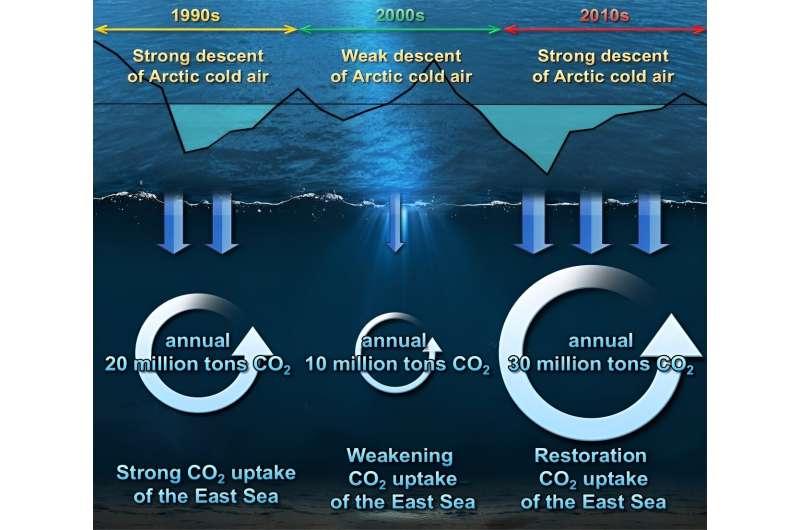
The recent cold spell has plunged South Korean into a deep freeze, resulting in the closure of 247 national parks, the cancellation of 14 domestic flights, and the scrapping of 107 cruise ship voyages. While the cold snap brought relief by significantly reducing the prevalence of particulate matter obscuring our surroundings, a recent study indicates that, besides diminishing particulate matter, it significantly contributes to the heightened uptake of carbon dioxide by the East Sea.
According to research conducted by a team of researchers, including Professor Kitack Lee from the Division of Environmental Science & Engineering at Pohang University of Science and Technology (POSTECH) and Professor Tongsup Lee and So-Yun Kim from the Department of Oceanography at Pusan National University, the cold atmosphere in the Arctic is influencing the absorption of carbon dioxide by the East Sea.
The research findings were published in Geophysical Research Letters.
The research team investigated the correlation between the East Sea’s surface-deep circulation and its carbon dioxide absorption capacity, drawing insights from 1992, 1999, 2007, and 2019 observations. During the initial period (1992-1999), the ocean absorbed 20 million tons of carbon dioxide annually.
In the subsequent period (1999-2007), this amount decreased to under 10 million tons per year. However, in the final period (2007-2019), the carbon dioxide uptake surged to 30 million tons annually.
The team observed that the internal circulation along the East Coast within the East Sea was influenced by the Arctic cold wave. Cold air from the Arctic infiltrates the East Sea, causing the surface water, laden with carbon dioxide, to become denser. This process induces vertical ventilation as the water descends into the middle and deep ocean layers.
Consequently, the intensified descent of cold air from the Arctic strengthens the internal circulation, leading to a heightened uptake of carbon dioxide in the East Sea.
Professor Kitack Lee, who led the research, said, “The oceans represent an immense reservoir of carbon dioxide and offer a secure and sustainable avenue for mitigating atmospheric carbon dioxide levels. It is crucial to anticipate the global ocean’s capacity for carbon removal as we navigate future climate changes and identify suitable methods to leverage this potential.”
In a related development, the team’s earlier research uncovered how the ocean absorbs carbon dioxide. Approximately half of the carbon dioxide generated by human activities remains in the atmosphere, with the other half entering marine and terrestrial ecosystems. With a carbon content 400,000 times greater than that of the atmosphere, the oceans present vast and promising potential for storing carbon dioxide.
More information:
So‐Yun Kim et al, Climate‐Driven Fluctuations in Anthropogenic CO2 Uptake by the East Sea in the North Pacific Ocean, Geophysical Research Letters (2023). DOI: 10.1029/2023GL105819
Citation:
Study investigates influence of Arctic cold air on carbon dioxide uptake of the East Sea (2024, January 5)
retrieved 6 January 2024
from https://phys.org/news/2024-01-arctic-cold-air-carbon-dioxide.html
This document is subject to copyright. Apart from any fair dealing for the purpose of private study or research, no
part may be reproduced without the written permission. The content is provided for information purposes only.

